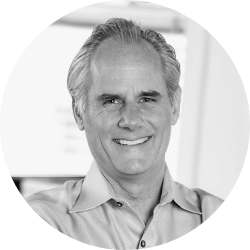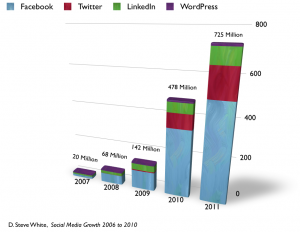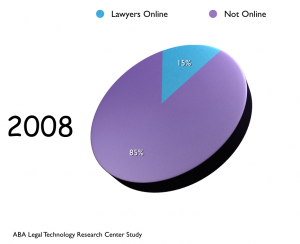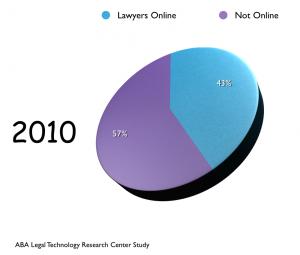 We all know procrastinators who wait until a week before the annual deadline to fulfill their mandatory MCLE requirements on subjects that many find the least interesting, such as ethics, substance abuse and diversity. My law school recently hosted a day-long program in late January that offered six hours of MCLE workshops to reach those attorneys who procrastinate, and I was asked to do one of the presentations. (Sounds like fun so far!)
We all know procrastinators who wait until a week before the annual deadline to fulfill their mandatory MCLE requirements on subjects that many find the least interesting, such as ethics, substance abuse and diversity. My law school recently hosted a day-long program in late January that offered six hours of MCLE workshops to reach those attorneys who procrastinate, and I was asked to do one of the presentations. (Sounds like fun so far!)
I decided to focus on the ethics of social media for attorneys, which I genuinely find interesting and relevant. But when I got the program, I saw that my presentation, which I co-taught with attorney Tom Tarkoff, was scheduled last. Great, I thought, we’re going to stand up after three hours of other ethics lectures, one hour on substance abuse and one on diversity and not have everyone rushing for the door. (Sounds like even more fun!)
At the start of the program, which attracted about 80 attorneys, one of the attendees told my co-presenter that she was not interested in the social media topic since she doesn’t use it. (It was getting better by the minute!) I looked around the room and saw a smattering of younger attorneys, but a heavy concentration of older attorneys who seemed unlikely to be engaged in any social media. They clearly couldn’t care less about the topic. (Yeah!)
OK, I’m a trial attorney trained to figure out how to get people interested in anything no matter how esoteric or uninteresting. What could I do to get their attention and make them care?
I decided to start my presentation with graphs and statistics showing the explosion of social media in all realms of life (’cause I just know that people love bar charts). I quickly redid my Keynote presentations while the other speakers were talking. When I got up, I put up this chart:
Then I asked the audience, “When attorneys look at this chart, what do they see?” After a long pause, a number of attorneys all shouted: “Clients!” Yes.
I then displayed two charts that indicate an almost 300 percent increase in lawyers’ online activity in the span of two years.
“If you’re not engaged in social media yet, chances are in a few years you will be,” I said. “More to the point, even if you’re not using social media, chances are the majority of people in your office are, like the associates, legal assistants and paralegals, and that involvement can have a huge effect on your business—for good or bad. Even more to the point, online companies like Rocketlaw, LegalZoom and others are growing at phenomenal rates by having lawyers engage in social media, and connecting them with prospective clients, in a way that is changing the nature of this business.”
Suddenly, the feeling in the room changed. The attendees went from thinking they had to suffer through the final hour’s lecture on ethics to genuinely caring about the topic once they realized how it can affect their bottom line and reputation.
The main general issue I discussed was that, as attorneys, we always have to keep in mind that anything we do or say online is subject to RPC Sec. 1-400 as a communication seeking professional employment, and B&P code 6158 prohibiting anything that is false or misleading. Nothing too surprising there.
A more interesting issue is how the requirements for disclaimers of “testimonials” work in social media. If an attorney tweets “Just received $1.4 million verdict for client,” B&P 6158.3 requires any electronic communication “portraying a result of a case” to include a disclaimer that the “factual and legal circumstances that justify the result portrayed in the message, including the basis for liability and the nature of injury or damage sustained, or the advertisement must state that the result portrayed in the advertisement was dependent on the facts of that case, and that the results will differ if based on different facts.”
I count 290 characters in that disclaimer, which makes it hard to fit into Twitter that limits a message to 140. One answer is to never give a case result on LinkedIn, Facebook or Twitter, since putting in this disclaimer is next to impossible, or at least really weird. The other possibility is to ignore the rule, which is generally not considered a good idea. Smarter people than I will have to figure out how to comply with this.
The audience also showed strong interest with the discussion of online companies like LawPivot, LegalZoom and Rocketlaw. All three are blurring the lines of the prohibitions against financial arrangements with non-lawyers (see RPC sec. 1-320) in that they all have ways in which they get paid, but they provide attorneys to answer questions or do other work. They also get into issues with advertising legal services and not being a law firm, which may conflict with B&P Code 6156 that makes advertising legal services without a license a misdemeanor. All these sites have various disclaimers, disclosures and such to avoid these statutes, but the lines are by no means clear. These companies may be the future of large parts of the law, and watching how they handle this issues will be interesting to say the least.
Attorneys’ use of social media will continue to increase dramatically, and recognizing the tensions and issues with the current rules is important at every step. These rules define us as a profession, and it’s extremely important to keep pace with these changes that are happening on a daily basis.
For more guidelines on social media ethics for attorneys, please see my earlier post, “Social Media Ethics for Lawyers: 4 Things Attorneys Should Not Do Online.” Additionally, I recommend an article I found through JD Supra, “A Lawyer’s Guide to the Top 13 Social Media Issues” by Sharon P. Stiller, Esq., of Abrams, Fensterman.




